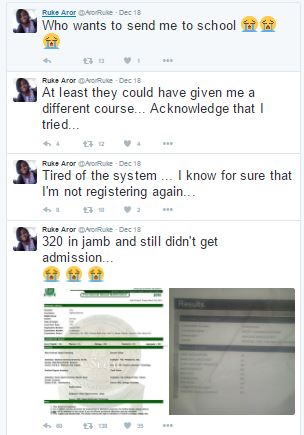This is a guest post by Abdulhafeez Babatunde Siyanbola, currently a doctoral student in the Department of Industrial Design (Graphic Design Section), Ahmadu Bello University in Nigeria. He is a brand consultant, graphics designer, photography enthusiast and the Creative Director of Craftsentials (an e-commerce site).

The challenges hindering the delivery of quality education by the Nigerian education system are multifaceted. These challenges are fundamentally encircled in these two words: “responsibility” and “regulation”. In the different strata of the Nigerian education system, development and effectiveness are consistently threatened by these aforementioned challenges. Adeyinka (n.d) noted in the following context that responsibility and control in the management of education is a challenge across the world:
The greatest-problem of educational development all over the world is that of responsibility and control. In this exercise, the various agencies of education are actively involved, at times in unhealthy rivalry or competition, but the pattern of this rivalry or competition is often determined by the nature and problems of development itself.
Education is considered to be a necessity for life and livelihood, it emancipates societies from the clutches of poverty and witlessness. However, the stumpy standard in the quality of education in Nigeria has limited its capacity to function effectively and this albatross is a reflection of the complacency of the Nigerian education managers to be assertive in taking charge responsibly.
Responsibility
“Responsibility” in this context implies the embrace of responsible practices in the approach to education management. Responsibility in the management of the Nigerian education system seems to be waning. This is evident in the selection of individuals whose mandate are to manage the Nigerian education system, some of them are round pegs in square holes. A situation whereby a newspaper columnist is appointed to be minister of education. What sort of meaningful impact will such an individual infused into the nation’s education sector. Apparently, this affect the churning out of resourceful policies which the education system is anchored upon. Over the years the system has been confronted with inconsistent policies, poor implementation of policies and policy summersault. Also, there is a sense of shortsightedness in the planning of the education system by concerned authorities. This has immensely contributed to the inability of the Nigerian education system to measure up with the required standard. Therefore the education system has fallen short of being responsive to the nations manpower needs. Some other negative effects of poor management are:
- Inadequate infrastructure
- Inadequate human resources.
- Insufficiency of funds
- Unconducive learning environment
- Poor remuneration of teachers
Regulation
The diverse system of education adopted by the different states of the country makes a uniform central control and enforcement of policies challenging. Most states have their own unique education system which are subtly in variance with the provision of the national policy on education. Therefore, there is no uniformity in the regulation of the education system which eventually affects the performance of students when moving from one state to another. Adeyinka (ibid) noted dual controls and inspection are also common, sometimes leading to conflicts, misunderstanding and retrogression within the school system. The consequences of uncoordinated regulatory framework to manage the educations system is an indication of the politicization and corruption prevalent in the Nigerian education system, complacency of teachers and administrators to adopt contemporary best practices in their approach to delivering quality is the apparent stagnancy in the development of school system. Obvious this has constitute an encumbrance to Nigeria national development
These myriad of seemingly insurmountable challenges can be addressed by engendering the culture of “responsibility”, effectiveness and impactful control couple with a robust political will to manage the Nigerian education system. The government has to enact a legislation that institutes a consistent mechanism of sustainable policy implementation and result-oriented monitoring across the country. However, in the formulation of education policies and implementation, the geographical location, diverse ethnicities and religious inclinations should be carefully considered. The development of the education system in Nigeria can only be measured by the level of its responsiveness to modern day challenges which is a reflection of quality and resourceful management control.
Reference:
Adeyinka (n.d). Current Problems of Educational Development in Nigeria.
The opinions, views or positions expressed or established in guest posts represent that of their writers and not necessarily of www.edusounds.com.ng.
Please, leave your thoughts on this post in the comment section and feel free to share the article with your contacts. Thanks for taking out of your precious time to read my article/s!
If you like this post, kindly subscribe and/or follow me on Twitter @otukogbe and @EdusoundsNg or on Facebook at edusoundsng.





This is the sad reality of the Nigerian state. Every sector is affected